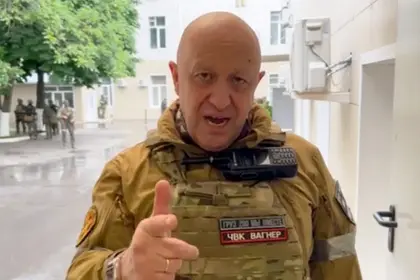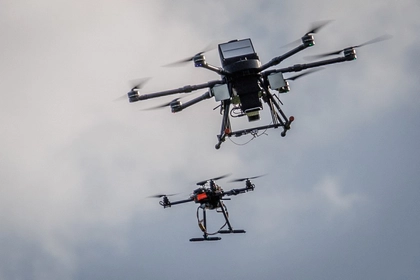Anthony Walbran, an Australian who is a frequent letter writer to the media, and London-based Sue Joiner asked the question was Prigozhin’s “march for justice” during the weekend June 23-24 a deception plan that had been carefully orchestrated between the Russian President and his former chef?
After several moments of thought I concluded it might not be as absurd as it initially sounded. It’s the sort of machination the former KGB agent might well come up with, being a devotee of the concept of maskirovka. I decided therefore to consider the hypothesis seriously by looking at what happened before, during and after Wagner’s advance on Moscow.
JOIN US ON TELEGRAM
Follow our coverage of the war on the @Kyivpost_official.
During my staff officer training in the British army, I was taught the formal process of “Appreciating the Situation.” This was a method where, when preparing an operational plan, you wrote down, in a structured way, all the positive and negative factors that might influence your strategy. In those early days, I and many of my fellow students were guilty of what our instructors called “Situating the Appreciation,” because we would think of a plan and then massage the facts to fit in with our original proposal, discarding anything which didn’t support it. I’ll try not to do that today.
Before the mutiny
For weeks, if not months, before the mutiny, Prigozhin harangued Russia’s military leadership, specifically the defense minister, Sergei Shoigu, and the chief of the general staff, Valery Gerasimov, for starving his troops of the ammunition and supplies he says they needed to complete their mission. He was very careful not to point the finger of blame at Putin, other than a couple of oblique references to a “grandfather” who was also culpable. Even without this essential materiel, he was content to send his convict soldiers into the meat grinder of Bakhmut.

Russia Tries to Sabotage Moldova’s European Ambitions as It Did for Georgia and Belarus
Meanwhile, Putin began to take steps to bind his Belarus ally, Alexander Lukashenko, closer to him. Although the Belarusian President had been verbally supportive of Moscow’s full-scale invasion of Ukraine and allowed Russia to launch attacks from Belarus into Ukraine, he had resisted further involvement. Putin announced that he intended to position tactical nuclear weapons in Belarus as a signal that the two countries were now a “unified state” and as a boost to the junior partner’s “self-esteem.” The siting of the weapons was ratified in an agreement signed on May 25 and Lukashenko announced that delivery had started in mid-June.
During the mutiny
Over the weekend June 23-24 the Yevgeny Prigozhin-led Wagner Group which had supported Russian military action in Syria, Africa and Ukraine embarked on its “march for justice” towards Moscow and in doing so, “captured” the city of Rostov-on-Don and its military headquarters, and shot down a number of Russian military aircraft. and marched to the capital city of Moscow last week.
By the time a deal was struck between Prigozhin and the Kremlin late on Saturday, June 24, supposedly after negotiations brokered by Lukashenko, the column was within 200 km of Moscow. Wagner’s mutiny, the speed of its advance and the apparent inability of Russian security forces to stop it shocked most observers and was interpreted as a sign of the Kremlin’s weakness.
But what if this was all part of Putin’s plan? Could the poor response by Russian defenses and the suggestions that some of its commanders knew about Wagner’s plans or even were part of a conspiracy be a pretext for a purge of those Putin considered to be disloyal or on whom he could blame for the failure of his Ukrainian adventure?
Part of Prigozhin’s avowed motivation for his “march” was for the removal of incompetent senior military staff which was used as an explanation as to why certain senior officers including Gerasimov and “General Armageddon,” Sergey Surovikin, had disappeared from sight and may or may not have been arrested as well as rumors that others were being replaced.
Had Prigozhin’s sudden volte-face already been pre-planned or was it, as he claimed, a decision he had made to avoid bloodshed? It was pointed out that during the course of the march north the rebels had shot down seven Russian aircraft, including an Ilyushin Il-22M airborne command post killing a reported 13 crew members. The loss of the latter was a potential blow but, if we believe that the whole thing was part of a Putin master plan, what is a dozen more casualties compared with the hundreds of dozens already suffered in the war on Ukraine? The Wagner anti-aircraft gunners would not have “been in” on the plan and needed to defend themselves from attack from airmen also ignorant of the bigger picture.
Was Lukashenko’s intervention, which supposedly brought the mutiny to an end, at his own initiative or Moscow’s? Whether or not he offered or it was suggested that he intervene it was yet another boost to his self-esteem to bring it to an end.
After the mutiny
Putin made a number of speeches and statements in which he tried to show that he was in control, culminating in his address to troops from the steps of the Kremlin on Tuesday, June 27, when he said that loyal forces had averted “civil war.”
The ceremony, which saw Putin standing on a red carpet and thanking the troops for averting the rebellion, was mocked online by a number of usually pro-Kremlin users as well opposition parties.
Perhaps he didn’t care if his “grand illusion” was progressing as he had planned. In his letter to the Guardian, Walbran wonders if the whole thing was concocted with the sole aim of increasing his footprint in and hold over Belarus. If Putin felt that, even with his nuclear weapons there, Lukashenko’s support was wavering what better way to bring him more firmly under control than by stationing “a private army of at least 25,000 battle-hardened troops, and [with] complete loyalty, into Belarus, ready to take over the country on command?”
Even if that wasn’t the intention, having Wagner in Belarus would create, at the very least, a distraction for Ukraine from its offensives in the south and east. A silver lining could also result if, reacting to the provocation of their presence led Kyiv to take pre-emptive action against them on Belarusian soil might be just the incentive Lukashenko needed to consider committing his own troops to Moscow’ “special military option.”
Sue Joiner asked: “Shouldn’t we at least be alert to the possibility that this whole episode has been a feint to get him and his troops into position in Belarus so that they can attack Kyiv from the north, catching Ukraine in a pincer movement? We’ve been caught off-guard before.”
The other thing to bear in mind is that Putin is an advocate for his version of history and used much of his post-muting speech to remind his people of the mutiny that followed Russian military failure in 1917.
“Intrigues, infighting, political games behind the backs of the army and the people have led to immense shocks, the collapse of the military and the state,” he said on the night of Friday, June 30. By implication, he was asking Russia did they want to repeat those mistakes.
Fantasy, Fiction or Fact
This is of course pure speculation and there are commentators more erudite and better informed than me who believe that what has happened with Prigozhin is merely symptomatic of the Russian President’s ongoing failure to “read the tea leaves” and to make ever more, from Russia’s perspective, egregious errors that compound the one big one he made on Feb. 24, 2022.
That said I believe this was a kite worth flying as Ms Joiner and Mr Walbran have suggested.
You can also highlight the text and press Ctrl + Enter






